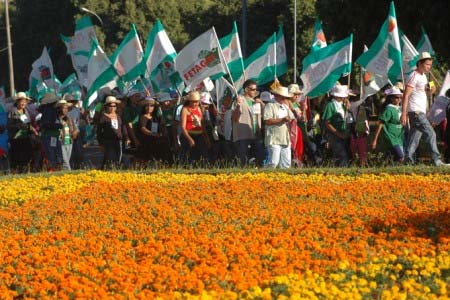Apr 15, 2025
Apr 15, 2025
The event was organized by CONTAG, Federations of the Agricultural Labors, and CUT. Women's movements like the Rural Women Workers of the Northeast (MTR-NE), Women Babaçu Nut Breakers, Women of the Amazonian, World March of Women, Latin American and Caribbean Rural Women's Network and Coordination of the Organizations of the Family Producers of Mercosul joined in as well. The march also had the support of Brazilian oil giant Petrobrás and the banks, Caixa Econômica Federal and Banco do Nordeste. Around 50,000 rural women workers from across Brazil came together for Marcha das Margaridas (March of the Daisies) in the capital, Brasília, recently. They marched to draw the attention of the federal government towards the necessities and concerns, of the women, such as welfare rights, food security and sexist violence.
Around 50,000 rural women workers from across Brazil came together for Marcha das Margaridas (March of the Daisies) in the capital, Brasília, recently. They marched to draw the attention of the federal government towards the necessities and concerns, of the women, such as welfare rights, food security and sexist violence.
This mass mobilization of rural women workers is held in honor of Margarida Alves, rural woman worker and unionist leader. She was murdered in 1983, in Paraíba in the northeast of the country, under the orders of landowners. Margarida, whose name means 'daisy' in Portuguese, was well known in the region for motivating rural workers to understand their rights and fight against injustice.
"This march began many years ago and the movement has blossomed in each Margarida's heart. We will struggle until the end for equality of rights and opportunities; and against poverty, hunger and sexist violence," said Carmen Foro, National Coordinator, National Confederation of Agriculture Workers (CONTAG), the largest peasant organization in Brazil. Foro is also Vice-President of the Unique Workers' Center (CUT).
At this third edition of the march - the first one took place in 2000 and the second in 2003 - 107 "requests" were presented to the federal government, in the form of a petition sent to President Luiz Inácio Lula da Silva two weeks prior to the event. The requests included the setting up of a forum to combat violence against women in the rural areas; devising measures to simplify access to credit for women; and support for projects related to food security.
Crowds of women made the Pavilion of Exhibition at Parque da Cidade their home for two days. The Pavilion, in full bloom with 800 vases of daisies in place, was the centre of hectic activity that included several cultural programmes and a special fair, besides the customary seminars and debates on natural resources, power, politics, development, income distribution and minimum wage.
Maria Elenice Anastácio, coordinator of CONTAG's National Commission of Youths, emphasized the importance of talking openly about the issue of domestic violence, something that several women in the rural areas live through every day. "In a fight between husband and wife, we [society] should intervene and speak up for the woman," she said, adding, "If we want to transform this country, it will not be possible till the women are included, respected and valued as people and political subjects." Anastácio, along with her mother and four sisters, was a victim of domestic violence.
She felt that it was not enough to just have the Maria da Penha Law. (This domestic violence law was passed last year. It carries an increased punishment for offenders.) "It's necessary to invest in more Women's Special Police Stations, mainly in the rural areas of the country."
A psychologist with the World March of Women, Analu Faria reminded the gathering that in the rural areas women are more isolated and have to struggle a great deal to ensure action against their aggressors. Thus, the establishment of Women's Special Police Stations in such places is imperative. "There are very few special police stations in the country. Most of them are in the capital and other metropolitan cities. It is important to institute this kind of service in the rural areas because it will make the women more confident," said Faria.
Maria Nazaré Andrade da Silva had come all the way from Nova Timboteua in the north to protest against the lack of technical assistance available to women farmers. She had suffered huge losses in cultivation and believed that the right know-how would have facilitated her production.
Most of the demands presented to the government were addressed in a ceremony held at the close of the event. It was attended by President da Silva and several ministers. Applauding the effort of the women, the President said, "You have demonstrated how well organized you are..." He gave his formal consent to the setting up of the Forum to Combat Violence Against Women. Other demands accepted include the widening of the programme of civil and labor documentation to include rural women workers; provision of greater resources to combat violence against women; national health policy coverage for rural residents; and measures to simplify procedures for women to obtain credit.
Prior to the event, the federal government had been accused of having financed the march. However, President da Silva denied the allegation, while the organizers said that the money had come from the women workers' themselves - they sold cakes, shirts, animals and even hats to raise funds.
"We support President da Silva and we don't get tired of struggling. We will continue fighting, but we know the difference, we know how to fight with political autonomy," said Foro.
Besides obvious visibility and social recognition, the march provided a platform to negotiate for better welfare programmes and schemes and influence public policies with regard to land acquisition, credit, social policies and citizenship rights. It also brought together women from different parts of the country, helping them to exchange notes and build partnerships.
21-Oct-2007
More by : Nelza Oliveira